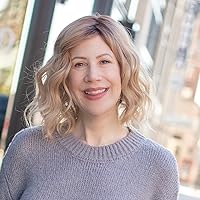Fatphobia Quotes
Quotes tagged as "fatphobia"
Showing 1-28 of 28

“Please tell me people who look like us can be loved.
Please tell me people who look like us can be desired.
Please tell me people who look like us can have happy endings.”
― Spoiler Alert
Please tell me people who look like us can be desired.
Please tell me people who look like us can have happy endings.”
― Spoiler Alert

“If I were in a different body, this would be the time I would lean down and kiss her. If I were in a different body, that kiss could transform the night from off to on. If I were in a different body, she would see me inside. She would see what she wanted to see.
But now it's awkward.”
― Every Day
But now it's awkward.”
― Every Day

“Because of the size of this body, I must concentrate much harder than I usually do. Even the small things -- my foot on the gas pedal, the amount of space I have to leave around me in the halls -- require major adjustment.
And there are the looks I get -- such undisguised disgust. Not just from other students. From teachers. From strangers. The judgment flows freely. It's possible that they're reacting to the thing that Finn has allowed himself to become. But there's also something more primal, something more defensive in their disgust. I am what they fear becoming.
I've worn black today, because I've heard so often that it's supposed to be slimming. But instead I am this sphere of darkness submarining through the halls.”
― Every Day
And there are the looks I get -- such undisguised disgust. Not just from other students. From teachers. From strangers. The judgment flows freely. It's possible that they're reacting to the thing that Finn has allowed himself to become. But there's also something more primal, something more defensive in their disgust. I am what they fear becoming.
I've worn black today, because I've heard so often that it's supposed to be slimming. But instead I am this sphere of darkness submarining through the halls.”
― Every Day
“...the current anti-fat bias in the United States and in much of the West was not born in the medical field. Racial scientific literature since at least the eighteenth century has claimed that fatness was ‘savage’ and ‘black.”
― Fearing the Black Body: The Racial Origins of Fat Phobia
― Fearing the Black Body: The Racial Origins of Fat Phobia

“I don't exactly get to be moody or snappy when I don't feel like putting on a happy face, because when most people meet me, I'm already starting out with a deficit. Fat girls don't get that luxury.”
― Puddin'
― Puddin'
“The legacy of Protestant moralism and race science as it related to fat and thin persons loomed large. Indeed, many early to mid-twentieth-century physicians relied on moral and racial logics to rail against persons deemed too fat or too thin. But over time, a growing number did so specifically, and exclusively, to condemn fatness.”
― Fearing the Black Body: The Racial Origins of Fat Phobia
― Fearing the Black Body: The Racial Origins of Fat Phobia
“...racial discourse was deployed by elite Europeans and white Americans to create social distinctions between themselves and fat racial Others. Black people, as well as so-called degraded or hybrid whites (e.g., Celtic Irish, southern Italians, Russians), were primary targets of these arguments.”
― Fearing the Black Body: The Racial Origins of Fat Phobia
― Fearing the Black Body: The Racial Origins of Fat Phobia
“Obesity Kills More Americans Than We Thought.’ This headline, from the health news section of CNN’s website on August 15, 2013, commanded readers’ attention. Accompanying the article is an image of a fat black woman. She is wearing a sleeveless top, revealing the dark, fleshy skin of her arms. A tape measure around her waist is being held together by a pair of delicate white hands reaching out from a white lab coat.”
― Fearing the Black Body: The Racial Origins of Fat Phobia
― Fearing the Black Body: The Racial Origins of Fat Phobia

“It was funny, she thought, that people treated her flesh like a public resource, a reservoir for all their insecurities and emotional dysfunction, when it was she who had their insides at her fingertips.”
― Manhunt
― Manhunt

“The world was less forgiving of its fat, ugly women. I knew that from firsthand experience. At best, people ignored you. At worst, they insulted you. Your existence was barely tolerated. By virtue of your looks, you had nothing to offer. It didn't matter if you were smart, thoughtful, or funny - no one listened. No one cared.”
― Nice Girls
― Nice Girls

“Or how cornmeal was better than flour because it had weight, and having weight is how you know your worth, so don't let anyone tell you different.”
― Other Birds
― Other Birds
“What is the utility of "body positivity" if it only seeks to provide one with a false sense of confidence rather than to liberate all from that which cages the body?”
― Belly of the Beast: The Politics of Anti-Fatness as Anti-Blackness
― Belly of the Beast: The Politics of Anti-Fatness as Anti-Blackness
“You can tell a lot about what a culture considers deformed by looking at its villains. They're more likely to be disabled in some way, but also more likely to be dark, old, fat, or fey.”
― Women and Other Monsters: Building a New Mythology
― Women and Other Monsters: Building a New Mythology
“Obesity seems to me very little understood or properly appreciated by the faculty and the public generally, or the former would long ere this have hit upon the cause for so lamentable a disease, and applied effective remedies, whilst the latter would have spared their injudicious indulgence in remarks and sneers, frequently painful in society, and which, even on the strongest mind, have an unhappy tendency...”
― Letter On Corpulence
― Letter On Corpulence
“...I am confident no man labouring under obesity can be quite insensible to the sneers and remarks of the cruel and injudicious in public assemblies, public vehicles, or the ordinary street traffic; nor to the annoyance of finding no adequate space in a public assembly if he should seek amusement or need refreshment, and therefore he naturally keeps away as much as possible from places where he is likely to be made the object of the taunts and remarks of others. I am as regardless of public remark as most men, but I have felt these difficulties and therefore avoided such circumscribed accommodation and notice, and by that means have been deprived of many advantages to health and comfort.”
―
―

“As though if I could make my body fit on one of these tiny barstools, I'd be in a perfect, fulfilling relationship instead of forcing myself to get through this date, wishing I could just disappear. Of course I know that none of that is true. That I can't change my body type (and don't even want to!), that thin women are no more happy than I am, that these insecurities are seeded and tended in my brain by the weight-loss industry, which profits from our collective self-loathing to the tune of $70 billion each year-despite the fact the 97% of diets fail. (Side note: What if we put all that money towards solving actual health problems instead? Could we cure ovarian cancer, like, tomorrow?) I know all these things, but tonight, I just can't feel them”
― One to Watch
― One to Watch

“Our culture treats weight loss as if it's about aesthetics or a vain quest to assimilate, but we rarely consider that it is sometimes a consequence of traumatic experience.”
― Weightless: Making Space for My Resilient Body and Soul
― Weightless: Making Space for My Resilient Body and Soul

“Me niego muchísimas cosas y, aun así, es mucho el deseo que palpita bajo la superficie de mi cuerpo.”
― Hunger: A Memoir of (My) Body
― Hunger: A Memoir of (My) Body
“Some [fat people], I believe, would willingly submit to even a violent remedy, so that an immediate benefit could be produced...”
― Letter on Corpulence
― Letter on Corpulence

“Did she not know that she was fat, perhaps? Had she missed that essential fact of her own physical reality, and needed it explicitly explained to her? There was nothing wrong with her, but she was smart enough to know that everything was wrong with her, and even the fact that her parents and her doctors said that dieting would only do her harm didn't change the fact that if she didn't find a way to magically become thin, she would never be accepted”
― Where the Drowned Girls Go
― Where the Drowned Girls Go

“Some of these people will act like their condemnation is in your best interest”
― The Intimacy Experiment
― The Intimacy Experiment

“What might change if we simply minded our body's business, and thought about other people's less?”
― Weightless: Making Space for My Resilient Body and Soul
― Weightless: Making Space for My Resilient Body and Soul
“What I am really naming here is the complicatedness of feeling both affirmed and harmed by your assault because your body is never really your own when you're fat and Black, and the trauma you arrive at upon realizing that there is no affirmation in touch indented to harm-or at least unintended to be sure of your consent.”
― Belly of the Beast: The Politics of Anti-Fatness as Anti-Blackness
― Belly of the Beast: The Politics of Anti-Fatness as Anti-Blackness
“I think about the thousand ways that the women in my family were silently (and sometimes outright) expected to give up their lives, their dreams, and their desires, so that they could become the glorified babysitters for the men in their lives who wanted a legacy but none of the responsibility of child-rearing.”
― You Have the Right to Remain Fat
― You Have the Right to Remain Fat
“Any future that doesn't center the eradication of oppression and collective freedom is not a future worth imagining.”
― You Have the Right to Remain Fat
― You Have the Right to Remain Fat
“You cannot earn freedom through conformity. You cannot buy your way in And we can only claim it when we recognize it is already ours.”
― You Have the Right to Remain Fat
― You Have the Right to Remain Fat

“When I look in the mirror, I don't see a body slimmed through strict dieting and weight loss. I see a body that's weary, that's battered, that has been through absolute hell. I see a body that's resilient and has gone through the wringer to keep me alive. None of what I've endured matters in this unwinnable scheme: I am thinner, and therefore everything I've experienced to get here is secondary.”
― Weightless: Making Space for My Resilient Body and Soul
― Weightless: Making Space for My Resilient Body and Soul
All Quotes
|
My Quotes
|
Add A Quote
Browse By Tag
- Love Quotes 97k
- Life Quotes 75.5k
- Inspirational Quotes 72.5k
- Humor Quotes 43.5k
- Philosophy Quotes 29.5k
- Inspirational Quotes Quotes 27k
- God Quotes 26k
- Truth Quotes 23.5k
- Wisdom Quotes 23.5k
- Romance Quotes 23k
- Poetry Quotes 22k
- Death Quotes 20k
- Happiness Quotes 18.5k
- Life Lessons Quotes 18.5k
- Hope Quotes 18k
- Faith Quotes 18k
- Quotes Quotes 16.5k
- Inspiration Quotes 16.5k
- Spirituality Quotes 15k
- Religion Quotes 15k
- Motivational Quotes 15k
- Writing Quotes 14.5k
- Relationships Quotes 14.5k
- Life Quotes Quotes 14k
- Love Quotes Quotes 13.5k
- Success Quotes 13.5k
- Time Quotes 12.5k
- Motivation Quotes 12k
- Science Quotes 11.5k
- Knowledge Quotes 11k

